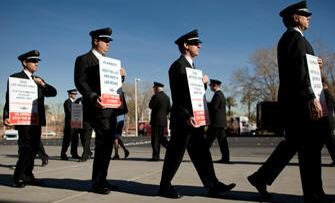|
|||||||||||
|
|
|
|||
|
US Airways Treats Pilots Unfairly |
||||
 |
September 9, 2010 -
The US Airline Pilots Association (USAPA), representing the
pilots of US Airways, picketed at the “The pilots of US Airways have made significant concessions to help the airline successfully navigate multiple bankruptcies and the economic challenges that resulted from the terrorist attacks of September 11, 2001,” explained USAPA President Mike Cleary. |
|||
|
|
||||
|
“Unfortunately,
the Railway Labor Act (RLA) permits this type of bad faith negotiating
behavior,” Cleary continued. “However, under specific circumstances, the
RLA also permits job actions. The result of our willingness to help this
airline in their times of need is that our pilots have been left far
behind the rest of the industry regarding pay and benefits. It is time
for that to change.”
In September 2005,
US Airways and America West Airlines announced a merger of the two
carriers. In USAPA’s view, that attempt at consolidation has not gone
smoothly.
“After more than
nine billion dollars in concessions to help save the airline, the East
pilots continue to work under a bankruptcy-era contract designed to help
the Company survive, while our fellow pilots from the original America
West Airlines continue to work under a contract negotiated under the
strict covenants of the Air Transportation Stabilization Board (ATSB)
loans.”
Before the merger,
both US Airways and America West accepted ATSB loans that were designed
to aid airlines that lacked reasonable credit after September 11, 2001,
and were heavily dependent on strict control of labor costs. |
||||
|
In April 2009, USAPA requested a National Mediation Board (NMB) facilitator to assist the parties in reaching an agreement, but US Airways rejected that proposal. In November 2009, USAPA applied directly to the NMB for federally-mediated talks. The NMB granted that request in January 2010. NMB-mediated contract negotiations are currently ongoing.
“It is important
that the public realize that we have always tried to work with US
Airways management to seek joint solutions, and we are committed to
doing so in our contract negotiations,” said Cleary. ”However, after
five years of Management’s stalling tactics – while we work for
substantially less than our industry peers – we have to consider what is
best for our membership.”
USAPA believes
that, should US Airways management fail to adequately address the
pilots’ concerns, contract talks could reach an impasse and end in a
self-help situation. “We regret any negative impact that our passengers may experience as a result of our exercising our right to bargain for an industry-standard contract. Our negotiating positions are reasonable, and we think that they’ll understand our unwillingness to being taken advantage of. Everyone has their breaking point. “It takes two committed parties to make a successful team; this is not a solo event,” Cleary added. “We are only asking for a willing partner. So far, we’ve been dancing alone.” |
|
|
| Other News Stories |
| ©AvStop
Online Magazine
Contact
Us
Return To News
|
|


